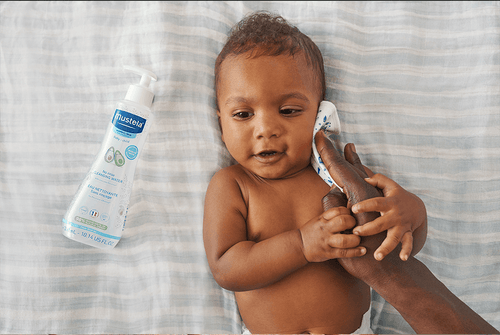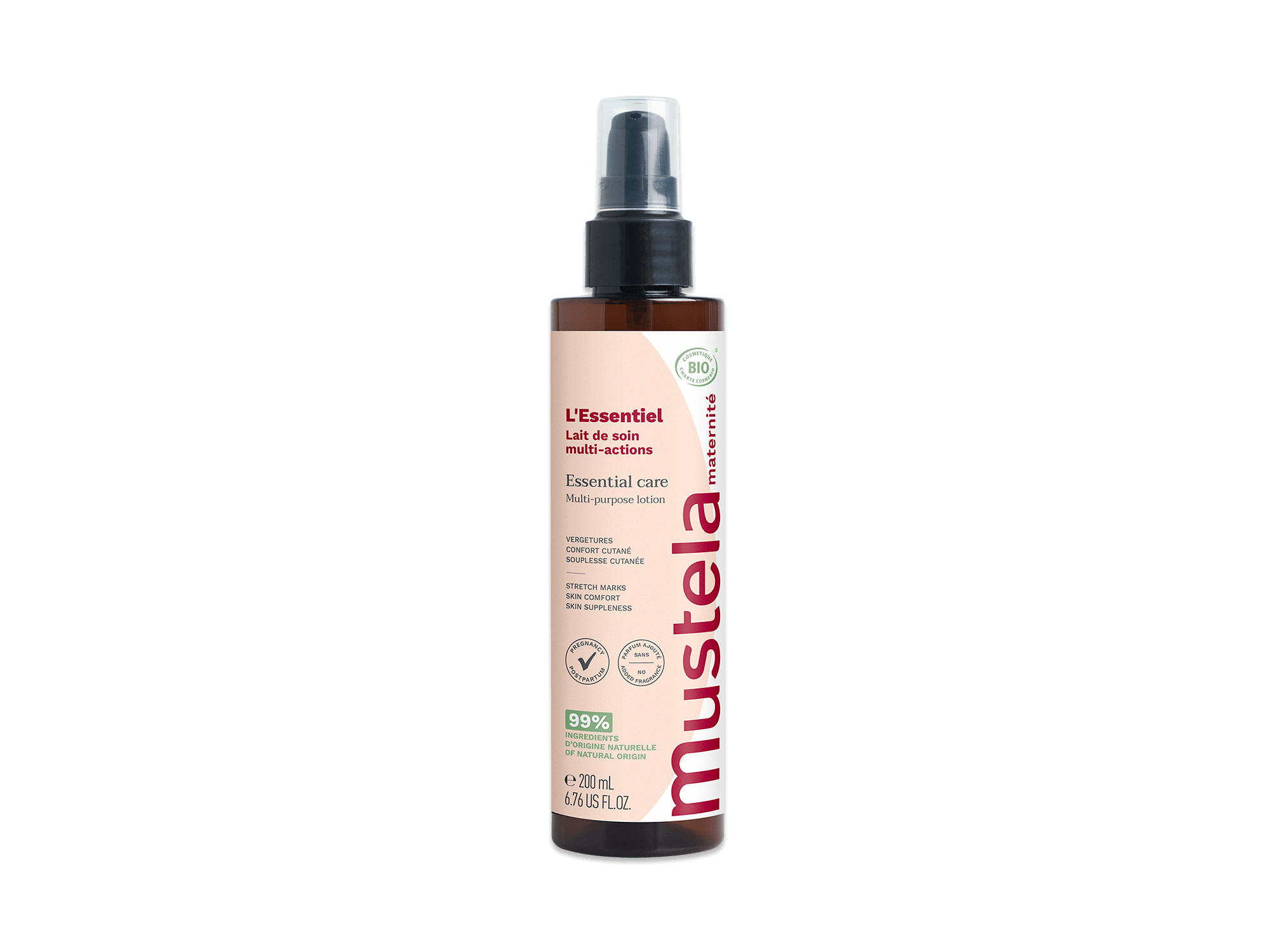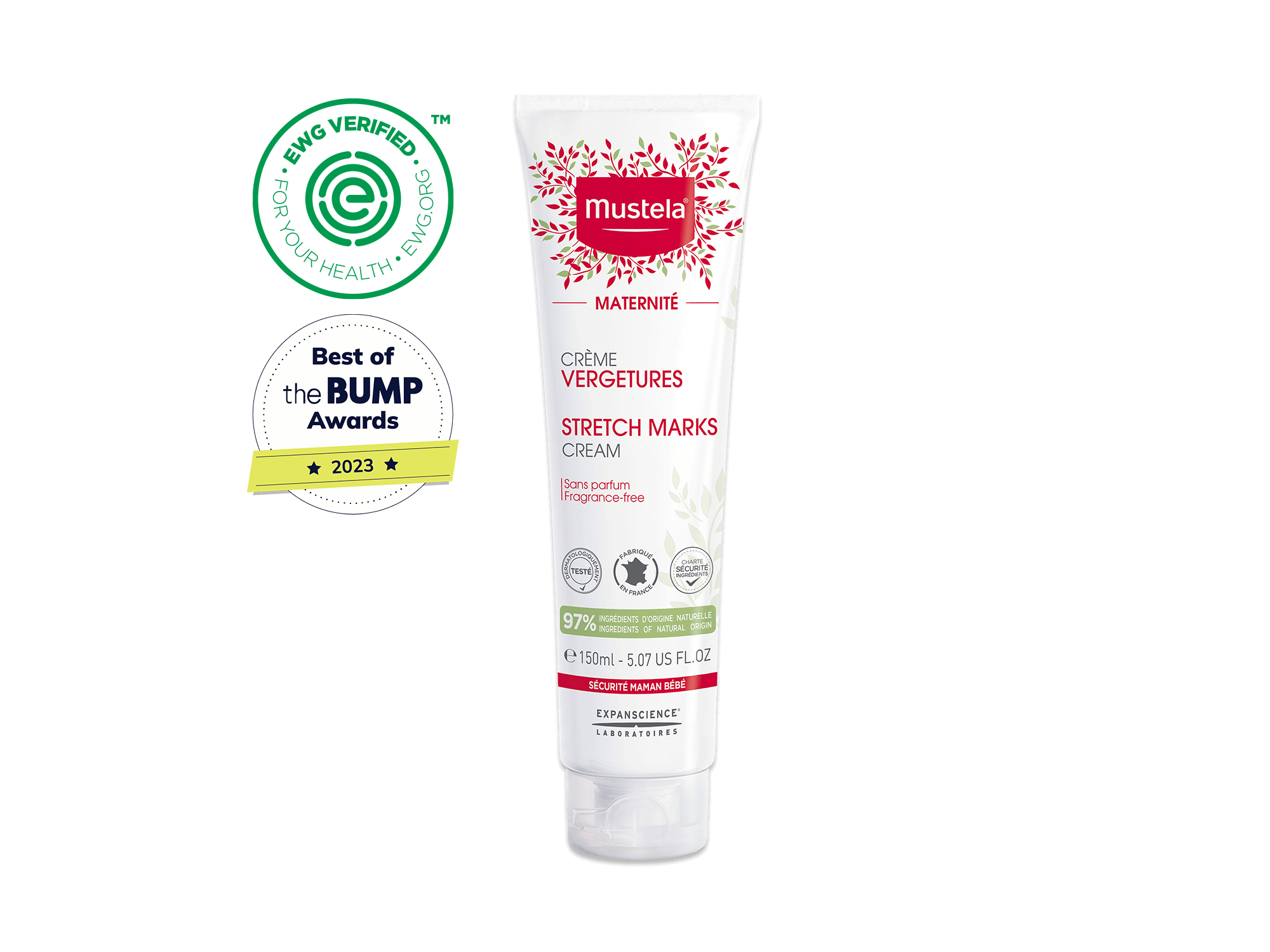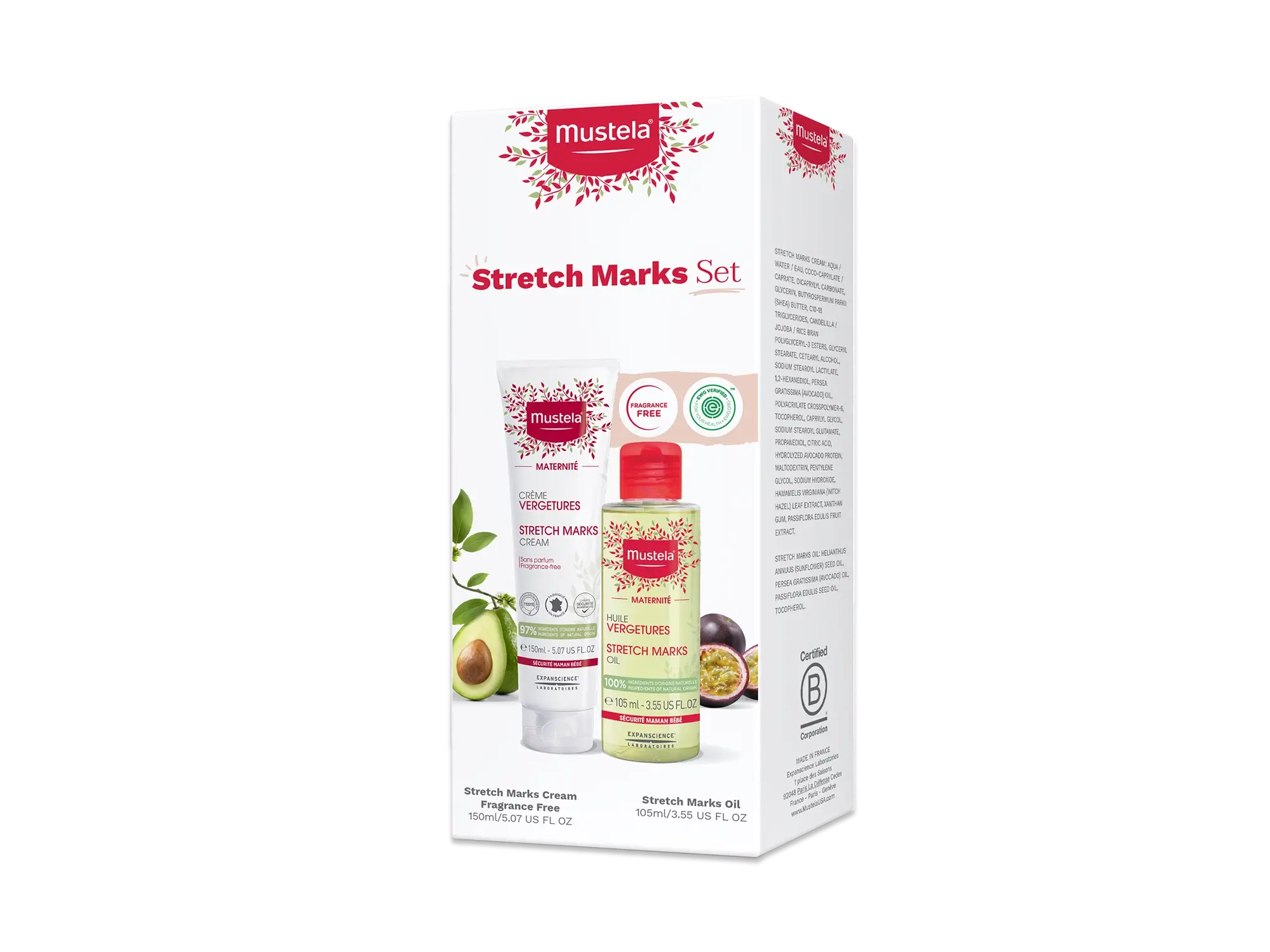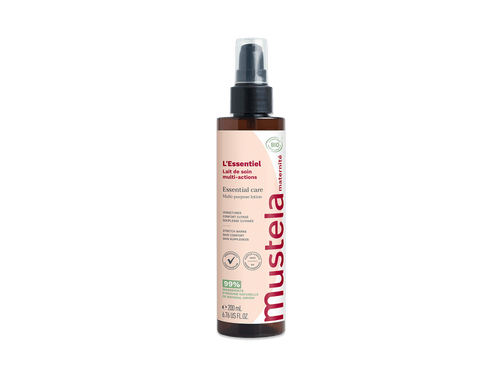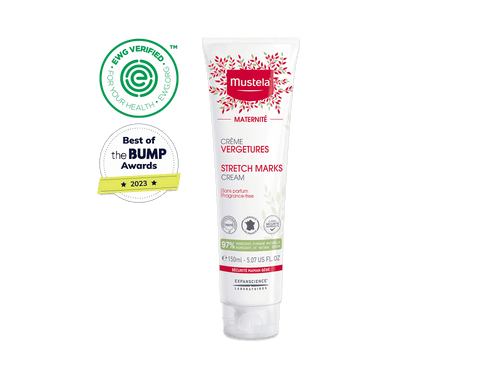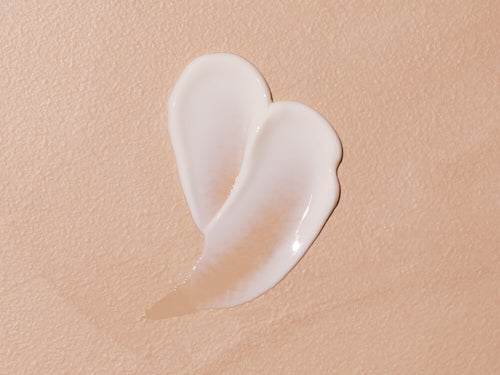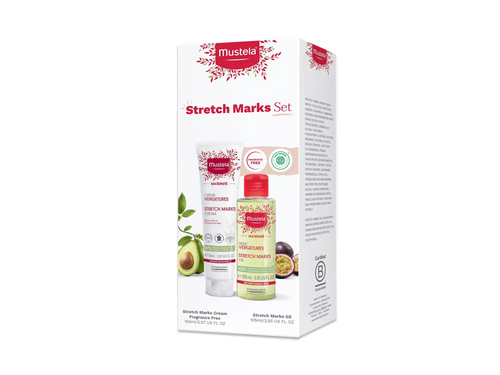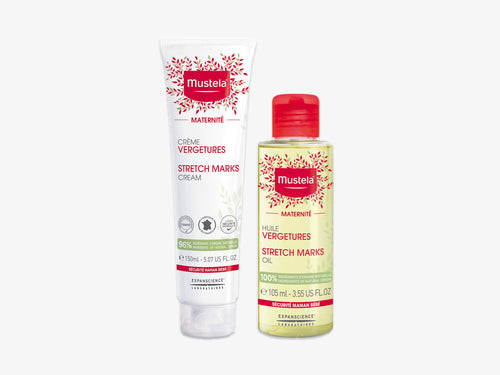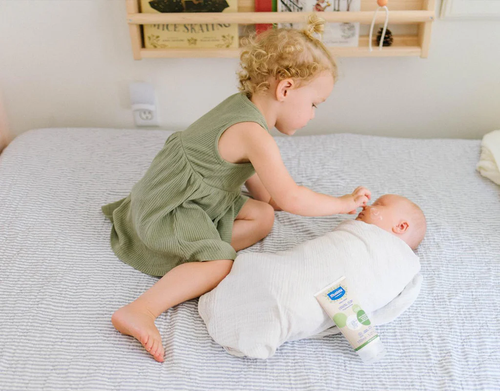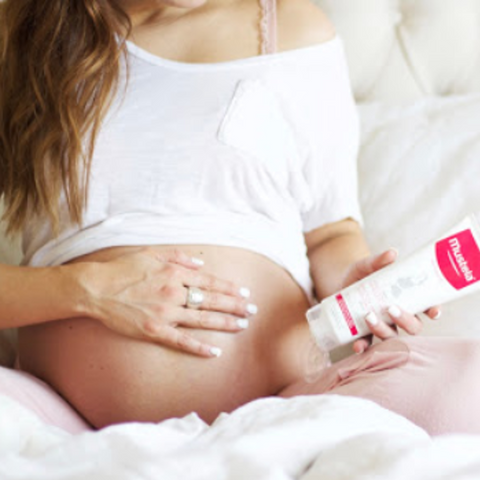Pregnancy is usually associated with an expanding belly, backaches, and morning sickness. But your body goes through a lot of other changes during pregnancy, too! Developing a pregnancy line, or linea nigra, is one change that might catch you by surprise.
If you’re confused by the dark line that has appeared on your belly, Mustela will clear things up for you! In this article, we’ll talk about what linea nigra is, whether or not it will go away, and what you can do to care for your skin during pregnancy.
Table Of Contents
- What Is Linea Nigra?
- Where Does It Come From?
- When Does Linea Nigra Appear?
- Will Linea Nigra Go Away?
- Treating Linea Nigra
- Skin Care During Pregnancy
What Is Linea Nigra?
Here’s a fact you can use to impress your friends: “Linea nigra” means “black line” in Latin. Although the line that shows up on your stomach isn’t exactly black, this is a simple but accurate description.
Linea nigra is a dark (usually brown) line on your baby belly that appears during pregnancy. It runs vertically from your pubic bone to your belly button or, for some women, even farther up the stomach.

If this unusual line takes you by surprise, you may be wondering if it’s dangerous to you or your little one. Good news: it’s not!
While linea nigra may be annoying and unsightly, it’s perfectly normal and you have nothing to worry about.
Where Does It Come From?
Linea nigra might seem like it magically appears on your stomach when, in fact, the line itself has been there all along. You’ve just never been able to see it!
Everyone (men and women alike) have something called the linea alba (Latin for white line), which is tissue that runs from the end of your breastbone down to your pubic area, connecting the left and right sides of your ab muscles.
When you’re pregnant, the linea alba can darken, forming the linea nigra. This skin-darkening is probably due to hormone changes in your body during pregnancy. It’s known as hyperpigmentation.
You might notice other changes in skin coloring during your pregnancy as well, such as darker nipples or dark spots on your face. Your scars and freckles may also get darker and more visible. These areas can even spread out as if they’re getting bigger.
Keep in mind that while these skin changes may seem odd, they’re perfectly normal.
When Does Linea Nigra Appear?

Linea nigra is common — the majority of women will develop this line while they’re pregnant. But you probably won’t notice it right away, since it typically shows up during your second trimester.
Women of all skin colors can get the pregnancy line, but it may be more noticeable on lighter skin.
Linea Nigra Outside Of Pregnancy
Though linea nigra is most often associated with pregnancy, pregnant women aren’t the only people who can experience this darkening line. It can also appear in men, newborns, children, and women who have never been pregnant.
A study in Nigeria found that changes in the level of sex hormones were responsible for this darkening skin. Birth control pills and polycystic ovary syndrome (PCOS) were also linked to this condition.
Other Hyperpigmentation During Pregnancy

As mentioned earlier, your skin goes through numerous changes when you’re expecting. And unfortunately, this line on your belly might not be the only hyperpigmentation you experience.
Many pregnant women also experience melasma. Since this condition causes dark patches or spots to appear on your face, it’s known as the “mask of pregnancy.”
While these spots aren’t itchy or painful, they can make you more self-conscious. Try to remember that you’re doing the important work of growing a baby!
Will Linea Nigra Go Away?
If you have linea nigra, you’re probably wondering if and when it will go away. The good news is that once you have your baby, linea nigra typically starts fading in the months following delivery.
But for some women, it never completely goes away, and it may come back if you get pregnant again. And, unfortunately, there’s really nothing you can do to safely prevent or treat it.
Treating Linea Nigra
If you want to reduce the appearance of linea nigra, you may be tempted to give bleach cream a try. But a word of caution: these creams aren’t safe to use while you’re pregnant or breastfeeding! Steer clear of them.
Even if you’re not pregnant or breastfeeding anymore, we still don’t recommend using bleach cream. Putting harsh chemicals on your skin is never a good idea!
Instead, one thing you can do to minimize linea nigra is to protect your skin from the sun. That means staying out of the sun and properly covering your skin when you do have a day outside or at the beach.
While you’re pregnant, your skin is extra sensitive to the sun and too much time soaking in those rays might darken your linea nigra. Stay in the shade, wear a hat and protective clothing, and lather on the sunscreen.

Since there’s no real treatment for linea nigra, the best thing to do is to remind yourself that it’s harmless to you and your little one and will likely go away after you’ve given birth.
Plus, remember that this line is a normal part of the miracle growing inside of you!
Skin Care During Pregnancy
Developing linea nigra might have suddenly made you aware of the impact that pregnancy has on your skin. Between stretch marks, dry skin, linea nigra, and PUPPP rash, there can be a lot going on!
We want to finish this article by letting you in on a few ways to show some TLC to your skin while you’re pregnant. Here are seven tips for skin care as an expecting mom!
1) Use Products That Are Safe For You And Baby
Once you become pregnant, your life changes. Not only are you preparing the nursery and buying cute baby things, but you also have to think about how your every action affects your unborn child.
What you put in your body — what you eat and drink — while you’re pregnant is, of course, important. So is what you put on your body!
First, ask your doctor if your current skin care regimen is safe for your developing little one. Then choose products that are safe and beneficial for you and your baby (both in and out of the womb!).
Check that your skincare products are free of the following questionable ingredients:
- Synthetic fragrances (not just “unscented”)
- Parabens
- Phthalates
- Phenoxyethanol
- Avobenzone
- Oxybenzone
- Formaldehyde
Speaking of ingredients, there’s a lot of talk nowadays about natural, organic, clean, and vegan skin care. It can really make your head spin!
So, while we’re on the topic, we’d like to briefly discuss each of these terms so you can make informed decisions about your and your baby’s skin care.
Natural Skin Care

Pregnant or not, natural skin care sounds appealing — as it should! In general, “natural” means that a product is made with chemical-free, plant-derived ingredients. Sounds great.
However, the “natural” label is not regulated. As long as a product contains some plant-derived ingredients, it can be called natural even if it also contains synthetic chemical ingredients.
As you can see, this can quickly get confusing.
And there’s another thing to keep in mind. We here at Mustela love natural ingredients and strive to use them in our products. But it’s also important to remember that some man-made ingredients are just as safe as natural ingredients.
Because of this confusion, it may be best to think about “clean” products in addition to “natural” ones
Clean Skin Care
Just like the term “natural” is not regulated, “clean” isn’t either. However, it’s a beauty and skincare movement that has really gained a following.
While natural skin care focuses on the source of the ingredients, clean skin care focuses on safety and can include both natural and synthetic ingredients.
The idea is that no matter where they come from, the ingredients are safe for your skin and the rest of your body.
We already mentioned a few of the ingredients that you’ll want to stay away from — ingredients like parabens, oxybenzone, and synthetic fragrances. That’s because these types of ingredients can not only irritate your skin but may also cause problems in the rest of your body.
Want to know how to get an idea of how “clean” a skincare product is? Check out its rating with the Environmental Working Group (EWG).
Organic Skin Care
When it comes to both food and skin care, “organic” refers to ingredients that were grown without pesticides, chemicals, and hormones.
And if the ambiguity of the terms “natural skin care” and “clean skin care” bothers you, you’ll appreciate “organic.” For a product to be labeled with an official USDA Organic seal, it has to meet certain regulated qualifications.
For example, a “100% organic” product must, of course, contain only organically produced ingredients. Meanwhile, “organic” means that the product is made up of 95% organic ingredients.
And, finally, if a label reads “made with organic ingredients,” it means that the product has at least 70% organic ingredients.
Vegan Skin Care

Lastly, you may be wondering what the fuss is about vegan skin care.
Just to be clear, “vegan” means that a product contains no animal products or animal by-products. This is, of course, important for people who are sticking to a vegan diet and lifestyle.
But vegan skin care matters even to meat-eaters since some animal products also contain questionable additives. That’s why some decide to opt for vegan skincare products regardless of whether or not they maintain a vegan lifestyle.
2) Drink Plenty Of Water
What you put inside your body affects your skin as well as your growing baby. You’ve probably heard it your whole life, but drinking enough water really is important, especially when you’re pregnant!
Drinking plenty of water hydrates your skin from the inside out. All that hydration helps your skin cells function correctly, repair themselves, and potentially ward off (or recover from) stretch marks — a great plus for pregnant women!
Keep a water bottle or glass of water nearby all day. And try sipping on hot tea or lemon-water to increase your fluid intake even more!
3) Use A Moisturizer
Keeping your skin supple and moisturized while you’re pregnant helps maintain its elasticity and makes you feel good! Daily moisturization is especially important if you’re dealing with itchy skin during pregnancy.
For a natural, safe, and organic option, choose Mustela’s Organic Hydrating Cream with Olive Oil and Aloe, which is designed to be safe and effective for the whole family.
This lightweight, fragrance-free cream is made with 99.6% ingredients of natural origin per ISO 16128 standard, including organic aloe vera, organic sunflower oil, and organic olive oil. And it’s not just good for your skin; it’s also eco-friendly!
The packaging is made from sustainably sourced sugar cane, and we’ve done away with secondary cartons. Plus, it meets EWG Verified™ criteria, which means that it avoids EWG's ingredients of concern and is committed to full transparency.
To moisturize your delicate bust area, apply Mustela’s Bust Firming Serum. Specially formulated for new and expecting mothers, this serum hydrates your bust (breast, neck, and neckline) to tone your skin and give it a firmer look and feel.
It contains hydrating, plant-based ingredients like centella asiatica, Elastoregulator®, and avocado peptides.
4) Prevent Stretch Marks

Stretch marks aren’t harmful to you or your baby, but we know that you’d rather they weren’t there! Get the upper hand on minimizing the appearance of stretch marks by regularly applying Mustela Stretch Marks Cream.
This non-greasy cream delivers long-lasting hydration to help prevent the appearance of stretch marks. For your peace of mind, it’s safe for both mothers and babies and is 100% compatible with breastfeeding!
If you prefer an oil or a serum, turn to Mustela Stretch Marks Oil or Stretch Marks Serum, which are designed for use during pregnancy and postpartum to help minimize the appearance of stretch marks.
Rest assured that both are tested under dermatological control and safe for you and your little one.
5) Wear Sunscreen
We mentioned sun protection earlier, but we’ll mention it again because it’s so important!
Sun exposure can darken your linea nigra, which is what you’re trying to avoid. But your skin also needs extra sun protection because it’s more sensitive than usual during pregnancy.
That said, don’t use just any sunscreen!
Remember what we discussed earlier about clean and safe skin care? That is important when picking out a sunscreen because traditional sunscreens use chemical UV filters — like avobenzone, octinoxate, or oxybenzone — to protect you from the sun’s rays.
While these ingredients may help you avoid sunburn, they can be irritating to your skin at best and, at worst, harmful to your body. Instead, opt for a mineral sunscreen made with safe active ingredients like zinc oxide and titanium dioxide.
But don’t stop there! Choose a sunscreen that’s hydrating, formulated without parabens, and safe for the whole family.
Mustela SPF 50 Mineral Sunscreen Lotion fits the bill! Not only is it made with mineral UV filters, but it also contains natural and hydrating ingredients including coconut oil, macadamia oil, and vitamin E.
The lightweight, sheer texture blends easily and does not leave a white cast on your skin. Plus, it’s compliant with Hawaii’s sunscreen ingredient requirements.
In addition to wearing protective clothing and a hat, apply mineral sunscreen 15 minutes before sun exposure and then again at least every two hours — more frequently if you’ve been swimming or sweating.
6) Don’t Dry Out Your Skin
When your skin is changing and you’re experiencing pregnancy acne or other conditions that make you self-conscious, it’s tempting to try to scrub the problem away.
Unfortunately, overwashing your face can dry it out. And dry skin can lead to additional skin problems.
To keep from falling into this trap, practice moisturizing skin care practices during your pregnancy. For example, don’t wash your face more than twice a day. And keep your showers shorter and cooler. Long, hot showers and baths tend to remove the natural oils from your skin.
Not getting enough sleep can also dry out your skin, so make sure you’re prioritizing rest during your pregnancy. You’ll also want to eat a varied diet that gives your body the nutrients it needs to thrive (and grow a healthy baby).
7) Plan Ahead
Taking care of your skin while you’re pregnant is important, but your skin will also need special TLC after you have your baby.
If you plan on breastfeeding, get ahead of the game: prepare for postpartum skin care by stocking up on Mustela Nursing Comfort Balm.

This soothing nipple cream moisturizes and protects sensitive nipples, eases discomfort, and helps to replenish and restore your skin during and after breastfeeding.
Made with 100% ingredients of natural origin per ISO 16128 standard, food-grade ingredients, this formula is free of lanolin and dye. It has a neutral smell and taste and won’t stain your favorite shirt!
Not only that, but it is also enriched with olive oil to nourish your skin and plant-based glycerin to moisturize and protect your skin.
Bye-bye, sore nipples!
Love Your Pregnant Body

You might wish that your linea nigra didn’t exist. But instead of resenting it, celebrate that line on your belly as evidence of the miracle of pregnancy and the baby that you’re getting ready to welcome into the world!
While you’re waiting on baby, love your pregnant body and ever-changing skin by wearing Mineral Sunscreen Lotion and using safe skin care products, like Mustela Organic Hydrating Cream and Stretch Marks Cream.
Soon, you’ll have your little one in your arms and, within a few months, your linea nigra will be a thing of the past!

